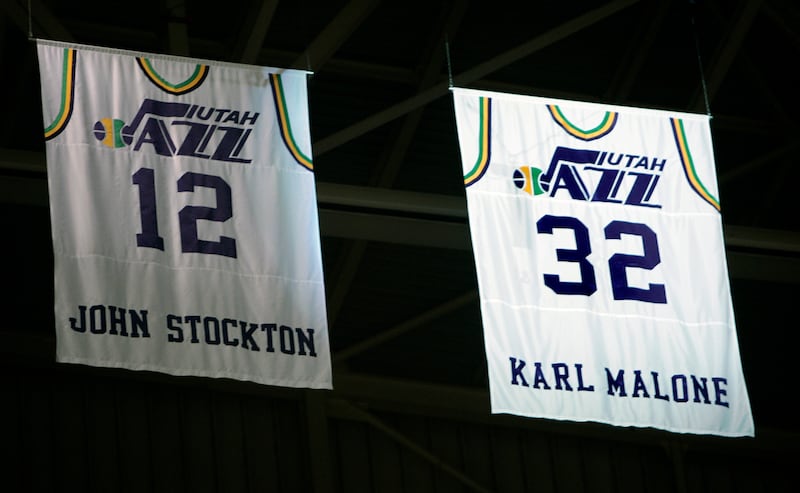One of the pinnacles of individual achievement in sports is to have your jersey number retired by a franchise, never to be worn again by a player on that team.
In the Utah Jazz’s history, which began in 1974 in New Orleans before the franchise was relocated to Salt Lake City, eight players’ numbers have been retired, along with two others that players would otherwise be eligible to wear.
In addition, one other has been “retired” to recognize legendary head coach Jerry Sloan.
Here’s a rundown of the Jazz’s retired numbers.
1 Frank Layden
Layden was a key piece of the organization from 1979-1989, first as general manager and then as head coach. After the franchise struggled mightily in its early years, Layden was a crucial figure in helping it become one of the most stable in the NBA in the 1980s. His larger than life personality only added to his legacy, and the No. 1 was retired to honor that legacy.
4 Adrian Dantley
Perhaps the most underrated player in franchise history, Dantley was a star, although he played on quite a few bad Jazz teams before they broke through and made the playoffs for the first time in 1984 in the middle of his time in Salt Lake City. Dantley was named an All-Star six times, an All-NBA player twice and led the league in scoring twice.
6 Bill Russell
The legendary Boston Celtics center retired five years before the New Orleans Jazz came into existence, but following his death in 2022, his No. 6 was retired across the entire NBA.
7 Pete Maravich
One of the game’s most well-known players ever, Maravich spent six of his 10 NBA seasons with the Jazz, five in New Orleans and one in Utah. In that time, he made four All-Star games, three All-NBA teams and led the league in scoring once. His No. 7 is also retired by the New Orleans Pelicans, and No. 44 is retired by the Atlanta Hawks. He died in 1988.
9 Larry H. Miller
The No. 9 was retired by the Jazz in 2010 to honor Miller, who bought a 50% stake in the team in 1985 and the rest in 1986, after he died in 2009. Miller’s business acumen was essential in turning one of the NBA’s most struggling franchises into one of its most stable. Miller’s late wife Gail put the franchise in a dynasty trust in 2017, signaling that the Miller family would own it in perpetuity, although it was sold to Ryan Smith in 2020 for $1.66 billion. The No. 9 retired to honor Miller is an homage to the number he wore playing softball, a sport he loved.
12 John Stockton
A franchise pillar for two decades alongside Karl Malone, Stockton is the NBA’s all-time leader in both assists and steals. Additionally, he was named an All-Star 10 times and has numerous other accolades to his name.
14 Jeff Hornacek
Hornacek is often seen as the most divisive player in terms of the Jazz’s decision to retire his number. That said, the sharpshooter arrived in Utah in 1994 and was a mainstay in the backcourt alongside Stockton until 2000 as the Jazz made their two NBA Finals appearances in franchise history in 1997 and 1998. Hornacek was an assistant coach with the franchise from 2011-2013 and returned in 2022 as a coaching consultant.
32 Karl Malone
Drafted by the Jazz in 1985 a year after they selected Stockton, Malone is third all-time in NBA history in points scored (he was second for many years until LeBron James passed him). He was named league MVP in 1997 and 1999 and made 14 All-Star appearances.
35 Darrell Griffith
The highest draft pick the Jazz have ever had, Griffith was taken with the second pick in the 1980 draft and played his entire NBA career in Utah until his retirement in 1991. In that time, Griffith was league Rookie of the Year and averaged 20 points per game in four of his first five seasons (he came up just short with an average of 19.8 in his second season) before taking a bit of a backseat to Malone.
53 Mark Eaton
One of the most dominant defensive players of his era (he played his entire career for the Jazz, from 1982-1994), Eaton won Defensive Player of the Year honors in 1985 and 1989 and was also named an All-Star in 1989. He died while riding his bicycle in 2021.
1223
Although 1223 is not a number a player would be eligible to wear, the Jazz retired this number in 2014 to recognize the number of wins Jerry Sloan tallied during his 23 seasons as head coach. The Jazz also wore this number as a jersey patch for a time following Sloan’s death in 2020. The No. 4 was retired by the Chicago Bulls in recognition of the 10-year playing career he had with them, which saw him be named an All-Star twice.


